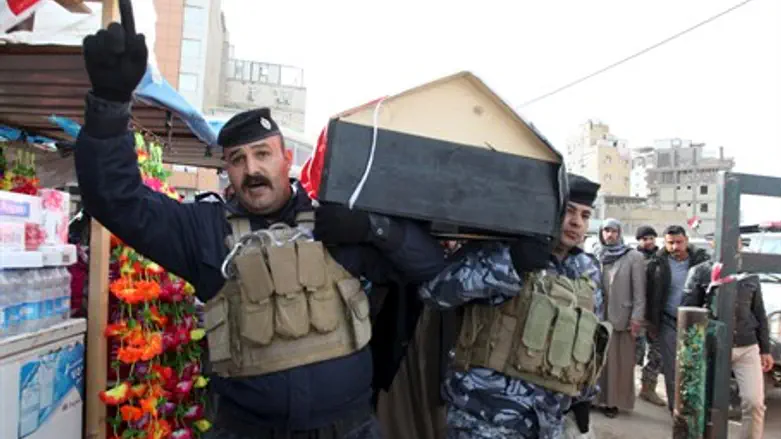
A suicide bomber struck a Shi'ite funeral northeast of Baghdad Monday, killing at least 24 people, including militia commanders, in an attack claimed by the Islamic State (ISIS) group, officials said.
The blast in Muqdadiyah, which also wounded dozens of people, threatens to spark another round of revenge attacks against Sunni Muslims in the area, like those carried out after bombings in January.
The latest attack targeted a funeral for a well-known Shi'ite member of the Beni Tamim, one of the main tribes in Diyala province, where Muqdadiyah is located.
Sadiq al-Husseini, the head of the Diyala province security committee, said that a commander from Asaib Ahl al-Haq and another from Badr - two powerful Shi'ite militias - were killed in the blast.
Officials in the province appealed for calm in the aftermath of the attack.
Muqdadiyah residents should "join hands to get out of the current crisis," said Ali al-Tamimi, the head of the Muqdadiyah district council.
And Diyala Governor Muthanna al-Tamimi said that: "Muqdadiyah will not fall into the trap of sectarian strife promoted by some politicians."
The Islamic State jihadist group claimed the attack in an online statement, saying a suicide bomber who detonated an explosive belt targeted a gathering of militiamen in Muqdadiyah.
It listed the names of some who were allegedly killed.
Suicide bombings are a tactic almost exclusively employed in Iraq by ISIS, a Sunni extremist group that overran swathes of the country in 2014.
Revenge attacks against Sunnis
The Muqdadiyah attack came a day after bombings in a Shi'ite area of northern Baghdad killed at least 39 people and wounded at least 76, the deadliest attacks in the capital so far this year.
ISIS said in an online statement that two of its suicide bombers carried out the Baghdad attacks.
ISIS also claimed an attack at a cafe in Muqdadiyah that killed at least 20 people and wounded dozens in January, after which revenge attacks targeted Sunni properties in the area.
Human Rights Watch said Shi'ite militiamen abducted and killed civilians in the Muqdadiyah area after the attack, in addition to burning homes and mosques.
Amnesty International also said that militiamen destroyed Sunni mosques, shops and homes following the January attack, and that authorities subsequently "turned a blind eye to this shocking rampage."
The death of militia leaders in the Monday bombing increases the odds of another round of revenge attacks in the area.
Iraq turned to Shi'ite militia forces in 2014 to help counter an ISIS onslaught that overran large areas north and west of Baghdad, and they have played a key role in halting the jihadist advance and later pushing them back.
But they have also carried out repeated abuses during the conflict that ultimately feed mistrust of the government and are harmful to Baghdad's efforts to reassert and maintain control in recaptured areas.
Diyala province was declared "liberated" from ISIS in late January 2015, but ending their open control of populated areas has not brought an end to attacks by the jihadists.
AFP contributed to this report.
